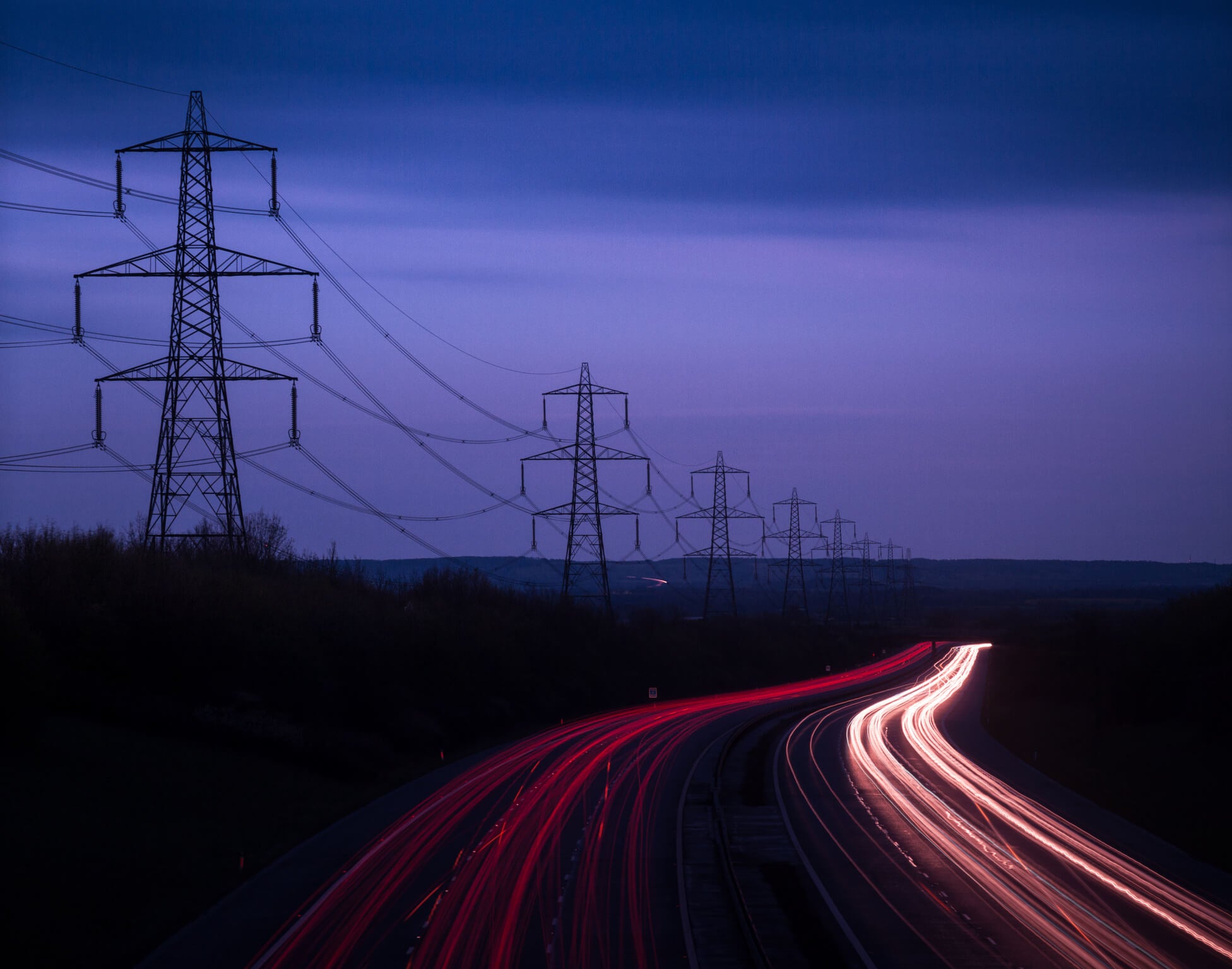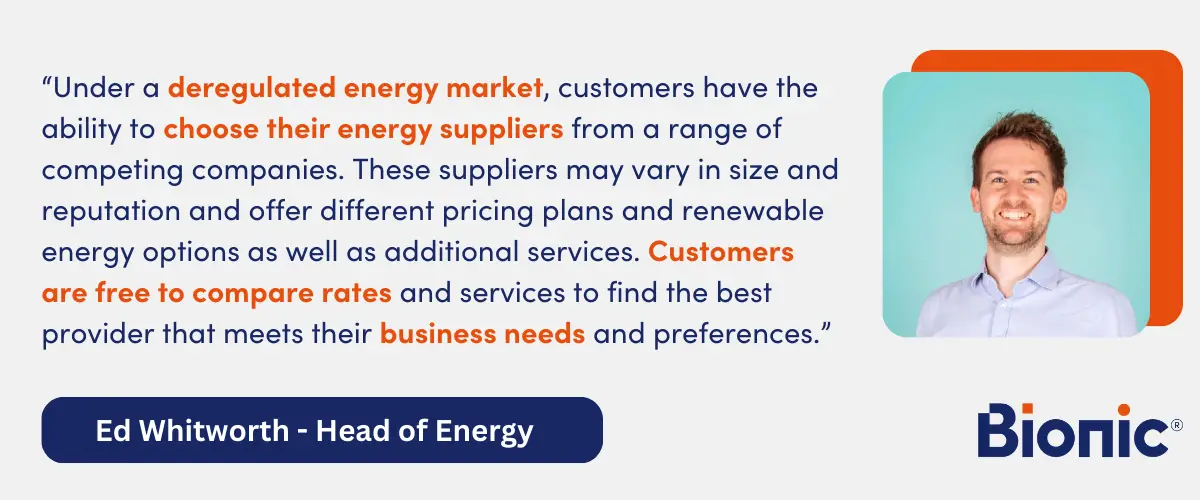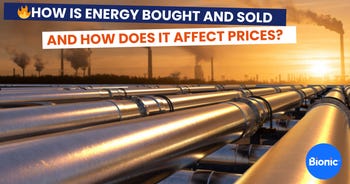What is energy deregulation, and what does it mean for UK businesses?
The UK energy market was deregulated in the 1980s. This was when the government ended its monopoly on the production, distribution, and pricing of gas and electricity, opening up the market to other providers. The idea behind deregulation is that it’s better for the industry and for consumers as it increases competition and choice.
But it doesn’t always work like that, and there are as many reasons against deregulation as there are reasons for.
Let’s take a closer look at what energy market deregulation means and how it affects the price and supply of gas and electricity.

30-second Summary
- Energy deregulation is about removing government regulation over energy resources. It also prevents one organisation from having total control over the whole market. This means people are free to choose their energy suppliers from competing companies.
- The benefits of regulation include increased competition, consumer choice, price transparency, and innovation. The disadvantages include market complexity, price volatility, limited access in rural areas, and potential supplier instability
- Deregulation is not exactly the same as privatisation, which allows private companies to compete in an industry.
- Energy deregulation policies vary across EU countries, with each implementing market reform differently.
- Bionic offers expert advice on navigating the complex energy market for UK businesses.
What is energy deregulation?
Energy deregulation is when the government's regulation and monopoly over the production, distribution, and pricing of energy resources like electricity and natural gas, are removed. This opens up the energy market for other suppliers to provide competition and offer consumer choice.

Is the UK energy market deregulated?
In the UK, deregulation of the energy market first came about in the 1980s as a small number of nationalised companies had control over the whole market. The government realised that the electricity companies across Europe and the US operated successfully under private ownership and wanted a piece of the action.
In 1989, the Electricity Act was introduced, which saw the privatisation of our electricity supply. It replaced the Central Electricity Generating Board in England and Wales and restructured the South of Scotland Electricity Board and the North Scotland Hydro-Electric Board.
The Act also established an industry regulator, now known as the Office of Gas and Electricity Markets (OFGEM).
What are the benefits of energy deregulation?
There can be a wide range of benefits for a deregulated energy market. These include:
- Increased competition — Deregulation encourages more energy suppliers to join the market, increasing competition. This competition can lead to lower prices for consumers as suppliers try to attract and keep customers. It also incentivises suppliers to improve their services and offer new products and services to stand out in the market.
- Consumer choice — A deregulated market provides consumers with the freedom to choose their energy supplier based on their preferences, such as the best price they can offer. With more suppliers to choose from, consumers can select the provider that best aligns with their needs and values.
- Price transparency — Deregulation helps with clear pricing in the energy market. Suppliers are required to compete on price, and consumers have access to information about various pricing plans and options. This transparency gives the power consumers to make better decisions and find the most cost-effective energy solutions for their business.
- Innovation and market entry — Deregulation helps with innovation and encourages new companies to enter the market. To compete, energy suppliers have to develop and offer new products and services. This can include renewable energy options, smart home technologies, energy management solutions, and other products that benefit consumers and promote sustainability.
But, it’s important to note that the benefits of energy deregulation can vary greatly across different markets.
What are the disadvantages of energy deregulation?
While there is a wide range of benefits, it’s not to say that a deregulated energy market doesn’t come without its disadvantages.
- Market complexity — While it can be a good thing that there’s competition within the energy market among suppliers, this can often leave consumers feeling a little overwhelmed. Deregulation can lead to a more complex energy market with numerous suppliers, pricing plans, and different contracts. This complexity can make it challenging for consumers to compare options and make decisions about their energy providers. Consumers may need to invest more time and effort into understanding the market and various offerings. But that’s where we make it easy — see our vetted panel of suppliers.
- Price volatility — Deregulated energy markets can experience price volatility due to factors such as changes in fuel costs, market conditions, and supply-demand dynamics. Price fluctuations can make it difficult for consumers to predict and budget their energy expenses, particularly if they are on variable-rate plans. It can also cause challenges for businesses that rely on stable energy costs.
- Limited access in rural or remote areas — For businesses that operate in remote or more rural areas, there can be a limited pool of energy suppliers to choose from. Suppliers may be less likely to invest in infrastructure and offer services in these areas because of lower profitability. So, businesses in these regions may have fewer options and face higher prices than those in more urban areas.
- Potential for supplier instability — Deregulation can lead to increased competition, which may cause some energy suppliers to struggle financially or exit the market. This instability can cause havoc for consumers, such as sudden changes in pricing, service quality, or even supplier bankruptcy. It's key for regulators to have safeguards to protect consumers in these situations.
How does energy deregulation affect renewable energy options?
Renewable energy is energy that comes from natural sources. They are replenished at a higher rate than they are consumed. The most common forms of renewable energy are solar, wind, biomass, hydro, tidal and geothermal.
On the positive side, energy deregulation makes energy suppliers offer renewable options to attract environmentally conscious businesses and help differentiate themselves in the market. Consumers then have the freedom to choose renewable energy suppliers that align with their sustainability goals.
However, renewable energy for business can be complex as tariffs are not widely available yet. Plus, some markets favour fossil fuels which can prevent businesses from getting to grips with renewable energy easily.
To find out more about renewable energy, check out our guide.
Does energy deregulation affect the reliability of energy supply?
When it comes to energy deregulation, there are some considerations when it comes to the reliability of energy supply.
It may take some time for new energy providers to get up and running with proper infrastructure to ensure smooth operations - and this can temporarily impact the reliability of energy supplies. However, there are measures in place for this as the National Grid manages the grid, ensuring it's stable.
What’s the difference between deregulation and privatisation?
Privatisation is where the government allows private companies to compete in an industry, which could also mean they’re competing with government-owned companies too. Privatisation is often used to increase efficiency, improve service quality, improve productivity, and attract private investment.
Deregulation, on the other hand, is the process of removing government-run organisations to allow for more competition in a certain market.
While there can be some overlap between deregulation and privatisation, they are different things.
Is energy deregulation the same across all EU countries?
Energy deregulation policies vary across Europe, and while the EU has been working towards a level energy market, each member country has their own way of going about it.
Get your business set with Bionic
Energy deregulation is a complex process that can affect businesses worldwide, not just in the UK. Energy deregulation means you can choose from a range of suppliers, but getting quotes from multiple suppliers takes time and effort.
That's where Bionic can help. Just one call to our tech-enabled experts is all it takes to compare quotes from our panel of suppliers. And because business energy is more complex than domestic energy, we'll talk you through the results to make sure you get the right deal for your business.
If you need more help understanding business energy, head over to our energy guide pages for more information. Or, get in touch today with the Bionic team to discuss your business energy needs, including electricity and gas.








